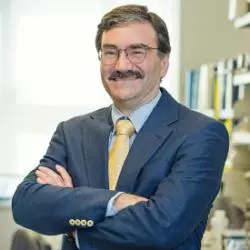
Daniel Klionsky
Biography
Daniel Jay Klionsky (* 1958 in California ) is an American biochemist and molecular biologist .
Klionsky earned a bachelor's degree in biology from the University of California, Los Angeles in 1980 and a PhD from Stanford University in 1986 . His dissertation is entitled Assembly of the Proton-translocating ATPase of Escherichia Coli . He worked as a postdoctoral fellow at the California Institute of Technology (Caltech). In 1990 he was appointed Assistant Professor of Microbiology at the University of California, Davis, and in 1997 he was given a full professorship there. In 1997/1998 he was a Guggenheim Fellow, a year of research at Dartmouth Medical School. Klionsky has been at the University of Michigan at Ann Arbor since 2000, initially in the Department of Molecular, Cellular and Developmental Biology and in the Department of Biochemistry in the Medical School there. In 2003 he moved to the Life Sciences Institute there, and has been Alexander G. Ruthven Professor of Life Sciences since 2006.
Work
Cell biologist Daniel J. Klionsky, Ph.D., is the Alexander G. Ruthven Professor of Life Sciences at the University of Michigan. Dr. Klionsky holds joint appointments as a faculty member at the Life Sciences Institute, where his lab is located, and in the Department of Molecular, Cellular and Developmental Biology in the College of Literature, Science, and the Arts. Working primarily with baker’s yeast (Saccharomyces cerevisiae), Dr. Klionsky’s research focuses on the cellular process known as macroautophagy/autophagy, which literally means “self-eating.” Autophagy is the process by which cells break down cellular components to survive stress conditions such as starvation. The failure of autophagy plays a role in cancer, neurodegenerative conditions such as Parkinson and Alzheimer diseases, and other areas of human health. Using biochemistry and molecular genetics, Dr. Klionsky’s lab has been asking questions about the individual molecules involved in the transport of proteins and cellular signaling related to autophagy. Answering these questions could help guide new therapeutic applications to treat or prevent certain diseases. Since the journal’s founding in 2005, Dr. Klionsky has also served as the editor-in-chief of Autophagy.
Field(s) of Study
Molecular and Cell Biology, Protein Targeting, Organelle Biogenesis, Autophagy
Areas of Focus
Cell Biology
Awards
- 2008 Fellow of the American Association for the Advancement of Science
- 2015 Van Deenen Medal
- 2019 member of the American Academy of Arts and Sciences
PUBLICATION HIGHLIGHTS
Cargo recognition and degradation by selective autophagy(link is external)
Gatica D, Lahiri V, Klionsky DJ, Nat Cell Biol (2018)
The exoribonuclease Xrn1 is a post-transcriptional regulator of autophagy(link is external)
Delorme-Axford E, Abernathy E, Lennemann NJ, Bernard A, Ariosa A, Coyne CB, Kirkegaard K, Klionsky DJ, Autophagy (2018)
Mutation in ATG5 reduces autophagy and leads to ataxia with developmental delay(link is external)
Kim M, et al., Elife (2016)
Hu G, McQuiston T, Bernard A, Park YD, Qiu J, Vural A, Zhang N, Waterman SR, Blewett NH, Myers TG, Maraia RJ, Kehrl JH, Uzel G, Klionsky DJ, Williamson PR, Nat Cell Biol (2015)
Bernard A, Jin M, González-Rodríguez P, Füllgrabe J, Delorme-Axford E, Backues SK, Joseph B, Klionsky DJ, Curr Biol (2015)
No items yet!
No items yet!
